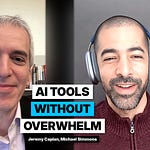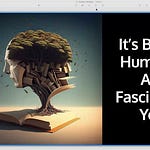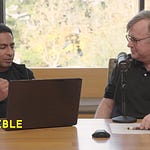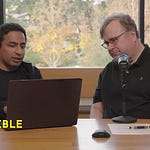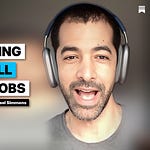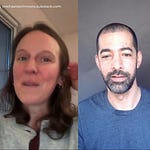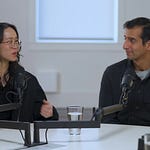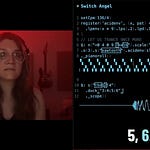Class Overview
What if the same scaling laws that make AI more intelligent could be applied to human development?
What if we're not at the end of human potential, but merely at the beginning—like Leonardo da Vinci as a teenager, convinced everything worth discovering had already been found?
In this inaugural session of Human Superintelligence, we explored how AI can serve as a mirror to reveal our deepest blind spots and accelerate our personal evolution.
The response was profound.
Participants reported insights that surpassed months of traditional coaching in just minutes. One attendee couldn't sleep after seeing how clearly AI mapped the ways their greatest strengths were sabotaging their future. Another discovered patterns they'd been unconsciously repeating for decades.
We particularly focused on a type of prompting that I call Possibility Prompting.
With Possibility Prompting, you collaborate with AI to explore the possibility space of valuable things that no human has ever shared before. This is in opposition to using AI to parrot back answers based on conventional wisdom and best practices.
Possibility Prompting is about using AI to see what we cannot see, to map territories of growth we didn't know existed, and to compress decades of personal development into months.
In the end, this course is based on the premise that when we combine exponentially improving AI with intentional human growth, we create something unprecedented: the conditions for human superintelligence.
During the class, we:
Explored why humans are "systematically undertrained" for our potential
Discovered how AI reveals multi-level blind spots
Used the "Charlie Munger prompt" for breakthrough insights
Mapped personal strength-shadows that sabotage success
Created transformative prompts customized to individual patterns
Witnessed AI compress months of coaching into minutes
Learned to generate infinite prompt variations instantly
Connected blind spots to relationship and financial patterns
Experienced how AI sees our "leading edge" clearly
Built personalized growth maps using conversation history
AI-Generated Podcast Summary Of The Class
RECORDING RESOURCES
Presentation Slides
Class Transcript
Resources Shared
AI Timestamps
AI Chapter Summaries
Chat Transcript
Presentation Slides
Class Transcript
Resources Shared
Shared by Michael
Prompts You Can Use
Michael’s Conversations With AI
Links
Shared by Students
AI Timestamps
Introduction and Welcome (0:00 - 1:25)
Human Super Intelligence Concept and Origins (1:25 - 4:00)
The Foundation: We Are Just Beginning (4:00 - 15:18)
Industrial Revolution and Optimization Examples (15:18 - 22:30)
AI Scaling Laws and Human Potential (22:30 - 29:00)
Videos on Human Development and Change (29:00 - 33:00)
AI as a Tool for Exponential Human Growth (33:00 - 37:00)
Three Levels of Knowledge: Conventional, Frontier, and Unknown (37:00 - 43:00)
The Charlie Munger Prompt Demonstration (43:00 - 50:00)
Participant Responses and Feedback (50:00 - 53:00)
Blind Spots Framework and Mapping (53:00 - 1:11:00)
Creative Prompt Applications and Business Opportunities (1:11:00 - 1:17:00)
Reflection and Takeaways (1:17:00 - 1:24:00)
Closing and Next Steps (1:24:00 - 1:24:34)
AI Chapter Summaries
Introduction and Welcome (0:00 - 1:25)
Summary: Michael Simmons welcomes participants to the Human Super Intelligence class, conducting introductions and encouraging participant engagement. He sets an interactive tone for the session and asks attendees about their motivations for joining the class.
Human Super Intelligence Concept and Origins (1:25 - 4:00)
Summary: Simmons introduces the concept of human superintelligence, crediting Anand Rao for coining the term. He explains how this concept builds upon Nick Bostrom's work on artificial superintelligence from 2013 and discusses how belief in AI superintelligence has led to widespread acceptance of artificial general intelligence as a possibility.
The Foundation: We Are Just Beginning (4:00 - 15:18)
Summary: Simmons establishes the core assumption that humans are at the beginning of their potential. He shares his personal journey beginning at age 16 with reading "How to Think Like Leonardo da Vinci," and explains how Leonardo felt everything had been discovered but went on to push human knowledge frontiers. The discussion includes the Dunning-Kruger effect and David Deutsch's work on the infinite nature of scientific discovery.
Industrial Revolution and Optimization Examples (15:18 - 22:30)
Summary: Simmons discusses his 300-hour study of the Industrial Revolution, focusing on Frederick Winslow Taylor's scientific management principles. He shares examples of dramatic productivity improvements through optimization, including shoveling techniques at Bethlehem Steel and Frank Gilbreth's bricklaying improvements, demonstrating that even seemingly optimized processes can be dramatically improved.
AI Scaling Laws and Human Potential (22:30 - 29:00)
Summary: The discussion moves to AI scaling laws and their implications for human learning potential. Simmons shares insights from AI researchers about how scaling laws might apply to human brains, suggesting humans could potentially learn for millions of years. He introduces developmental psychology concepts from Jean Piaget and Robert Kegan about adult development stages.
Videos on Human Development and Change (29:00 - 33:00)
Summary: Simmons presents video content featuring developmental psychology insights, including a discussion about living longer to develop higher orders of consciousness and Daniel Gilbert's research on how people underestimate their future change. These videos support the argument that humans are constantly evolving beings rather than fixed entities.
AI as a Tool for Exponential Human Growth (33:00 - 37:00)
Summary: Simmons discusses how AI can accelerate human development exponentially, presenting the idea that as AI improves exponentially, it provides tools for humans to grow exponentially as well. Participant Faith shares insights about different brain systems and the importance of addressing experiential and primitive brain patterns alongside cognitive development.
Three Levels of Knowledge: Conventional, Frontier, and Unknown (37:00 - 43:00)
Summary: Simmons introduces a framework for understanding different levels of knowledge use with AI: conventional wisdom (textbook knowledge), frontier knowledge (cutting-edge practices by top performers), and the unknown (unexplored territories). He explains how AI can help access all three levels, particularly in mapping unknown territories that were previously inaccessible.
The Charlie Munger Prompt Demonstration (43:00 - 50:00)
Summary: Simmons introduces and demonstrates a powerful AI prompt based on Charlie Munger's thinking about strengths becoming weaknesses. The prompt analyzes how personal strengths could backfire over time, creates future scenarios, and presents insights in an engaging narrative format designed to inspire profound personal change.
Participant Responses and Feedback (50:00 - 53:00)
Summary: Participants share their powerful responses to the Charlie Munger prompt, with several reporting profound insights about their mental states and personal patterns. The responses demonstrate the transformative potential of well-crafted AI prompts for personal development.
Blind Spots Framework and Mapping (53:00 - 1:11:00)
Summary: Simmons presents a comprehensive framework for understanding different orders and types of blind spots, from first-order (basic knowledge gaps) to third-order (meta-level limitations). He demonstrates how to map blind spot categories and use AI to generate prompts for each type, showing how one framework can generate an entire year's worth of development work.
Creative Prompt Applications and Business Opportunities (1:11:00 - 1:17:00)
Summary: The discussion covers how thought leaders can transform existing frameworks into AI prompts for their audiences. Simmons shows examples of prompt creation for business applications, including image generation for frameworks and the potential for monetizing knowledge through prompt-based offerings.
Reflection and Takeaways (1:17:00 - 1:24:00)
Summary: Participants share their key takeaways from the session, including plans to implement blind spot prompts, integrate insights into daily journaling, and experiment with new approaches to personal development. Simmons emphasizes that they're at the beginning of an exciting journey of human potential development.
Closing and Next Steps (1:24:00 - 1:24:34)
Summary: Simmons concludes the session with logistics about recordings and future sessions, expressing excitement for the year-long journey ahead and the potential for participants to develop in ways not yet documented in traditional literature.
Chat Transcript
00:00:50 Janet Ridsdale: Happy Friday to all, audio only today
00:01:02 Tim Schneider: I saw an email and a free Slot in my schedule ;)
00:01:04 Michael Glenn: Just the idea of being more intelligent
00:01:13 Kevin Whitcher: Superintelligence - What’s not to love?
00:01:14 Michael Glenn: Dunno how else to say it
00:01:15 Max Bernstein: Learn from the best
00:01:15 Janet Ridsdale: To learn more about how we can be more intelligent
00:01:17 Jonathan Hughes: I want to see how to wrap this around the other two prongs of this course
00:01:21 Michael McGreevy: Normalizing new thought patterns
00:01:25 faythebuchanan: The opportunity for humans to upgrade, not just AI.
00:01:30 Leandra: Self-optimization
00:01:33 Michael William Roach: How to be more intelligent but in multiple different types of intelligence
00:01:42 John Kelly: How AI can amplify our intelligence and identify things were were not aware of.
00:01:45 Stanley Wilson: The coupling of AI, Mental Models and Superhuman Intel is the interesting topic for me
00:01:46 Janet Ridsdale: yes
00:01:46 Bonnie J.: yes
00:01:49 Michael Glenn: Replying to "Self-optimization"
I like that! 🙌
00:02:51 Marcin Podolski: Hi everyone
00:03:21 Leandra: “Intelligence that improves upon itself and is recursive.” 🎉
00:04:05 Kevin Whitcher: Superintelligence: Paths, Dangers, Strategies by Nick Bostrom
00:04:12 Marcin Podolski: Using AI to develop my own meta awareness and complex integrity I see as Superintelligence
00:05:03 Leandra: Yup!
00:06:19 faythebuchanan: Its so hard to imagine beyond what we know.
00:06:34 Stanley Wilson: Yes
00:06:38 Tim Schneider: everyday is a new cycle
00:06:39 Marcin Podolski: weaponized dunning-krueger effect is often used in propaganda and social engineering
00:06:40 Janet Ridsdale: yup
00:06:40 Leandra: 😂 yes
00:07:23 Lisa Ross: So sorry i can’t do video today but I’m here! 👋
00:07:39 Vikram K: Same here!
00:08:16 Janet Ridsdale: me too
00:08:29 Gabriel Garcia: Sorry, what’s the name of the book, again? (sorry!)
00:08:37 Jeff: The questions are the purpose
00:08:54 Leandra: Replying to "Sorry, what’s the na..."
the beginning of infinity explanations that transform the world by david deutsch
00:09:00 Gabriel Garcia: Replying to "Sorry, what’s the na..."
Thank you!
00:09:09 Leandra: Replying to "Sorry, what’s the na..."
No worries
00:10:14 Leandra: Too many 😂
00:13:20 faythebuchanan: His method did not account for differences between body shapes and strength.
00:13:44 Malliha: yes
00:15:33 Michael McGreevy: 5x
00:15:35 Kevin Whitcher: +300%
00:15:37 Janet Ridsdale: 10x
00:15:38 Michael Glenn: 10x
00:15:38 Stanley Wilson: 7/8x
00:15:40 Bonnie J.: At least 100%
00:15:44 faythebuchanan: 40%
00:15:45 Tim Schneider: id probably do less
00:15:47 Malliha: By 15-20% to start
00:17:37 Tim Schneider: I think you Need to "optimize for Sound" when sharing in zoom
00:17:59 Max Bernstein: Sounds like a wire is loose
00:18:14 Tim Schneider: weird that miachel hears it too
00:18:43 John Kelly: good!
00:18:47 Jonathan Hughes: perfect now
00:21:03 Leandra: I saw this clip a few weeks ago!
00:22:52 faythebuchanan: What was his name?
00:23:00 Tim Schneider: Replying to "What was his name?"
Robert kegan
00:23:17 faythebuchanan: Replying to "What was his name?"
Thanks! That was so brilliant!
00:27:23 Leandra: With the price of concerts today, I’m curious to know how these numbers change.
00:28:16 Tim Schneider: "humans are work in Progress, that think they are finished"
00:28:27 Leandra: wow
00:28:38 Jeff: Maybe the affect is more immediacy bias. We have already heard the old musicisn alot. But the newer musicisn is still immediate.
00:28:55 Jeff: sorry my typing is terrible!
00:29:36 Malliha: We are constantly evolving. What we like before will not be the same. Just as nature changes so do we and we're connected to this planet. Eveerything seems to be ephemeral.
00:30:30 Leandra: I’ve grown so much and I’m incredibly curious to see what directions I go in with augmented super intelligence. It’s so exciting if you’re voraciously curious.
00:30:38 Kevin Whitcher: The amount of potential choices to choose from - a decision process which can be accelerated by AI
00:30:40 Michael McGreevy: Helping others increase in curiosity as they are wondering what’s next in this AI era
00:30:56 Janet Ridsdale: Excited for how we can help people develop their potential
00:31:04 Bonnie J.: The potential of AI to help me see things that I can’t see right now.
00:31:04 faythebuchanan: I would think the different levels of the brain change at different rates.
00:31:13 Gabriel Garcia: We need a constant mindset upgrade to respond (adapt) to change/uncertainty instead of react to it.
00:31:30 Malliha: More conciousness and more applied learnings.
00:31:58 Jeff: Curiosity is the key. I think real learing and wisdom is the connection of knowledge across disciplines. This is where real invention happens.
00:33:58 Marcin Podolski: AI Augmented Mentalization and Meta Mental Models give unprecedented possibilities to play with analysis, synthesis and predictions. I have done lately AI simulation of AI to map out how every stage on spiral dynamics would use AI strategically
00:37:53 faythebuchanan: Replying to "AI Augmented Mentali..."
Sounds fascinating!
00:38:16 Max Bernstein: 👋
00:38:35 Michael McGreevy: Never used it, but heard the quote
00:38:37 Leandra: I haven’t used this one yet
00:38:57 Gabriel Garcia: I was scared of using it, being honest
00:39:04 Michael Simmons: https://blockbuster.thoughtleader.school/p/tell-me-where-ill-die-ai-prompt-use
00:39:10 M Taylor: not yet
00:40:30 Leandra: OH! I DID use this prompt and my mind was blown.
00:42:50 Michael Simmons: https://docs.google.com/document/d/1XMe2u7Zi0lBt_ZOImSr6vKe7U_WniZM8tQ0HhxSe3yA/edit?tab=t.m7arzkbm1ezo
00:43:17 Malliha: I wonder what percentagee of people act on the knowledge they receive after GPT provides them with such deep insight.
00:45:52 Gabriel Garcia: Question: Do you think you might update/modify prompts in the future? This question is underlying to the question… do you think we should keep the original doc you share or make a copy? If we keep the original doc we will see the updates you make, while if we keep the copy only we won’t. If it’s irrelevant for some reason, feel free to let me know. I don’t know what I don’t know, haha.
00:46:43 Janet Ridsdale: This is its final thought
00:46:48 Janet Ridsdale: You have always been a gardener of souls, Janet. The world needs your fruit now. Not later.
Let this be your Christmas Eve. Let the ghost of "what never landed" awaken you to what can.
You already have the pen.
The page is waiting.
Shall we begin?
00:47:08 Leandra: Replying to "I wonder what percen..."
I do, too. I know how much I don’t act on. It’s easy to get caught in the cycle of looking for more insight. GPT called me out on this during a conversation using this prompt actually.
00:47:36 John Kelly: How It Works: Your strengths create a latticework of self-justified stasis. Each strength rationalizes the absence of bold, public embodiment. Reflection replaces revolution. Clarity replaces courage. Dreams replace deeds. All while appearing virtuous.- <bingo!>
00:48:19 Janet Ridsdale: So on point. I will have to digest
00:48:24 michael rakestraw : Replying to "Self-optimization"
It turns out I’m already practicing ChatGPT’s recommendations
00:49:21 michael rakestraw : It turns out I’m already practicing ChatGPT’s recommendations
00:49:55 Kevin Whitcher: Wow - it so got me. I had a session with a medium earlier today which I have yet to feed into ChatGPT - but the themes are in the same ballpark
00:49:58 Vikram K: This is so deep, this prompt captured the gist of my current mental state in 5 minutes, which has not been possible with hours of counselling....
00:50:11 Max Bernstein: Replying to "This is so deep, thi..."
AI is wild
00:51:12 Michael McGreevy: It hurts to see the truth so clear, but it’s the pathway to change.
00:52:23 Malliha: Replying to "I wonder what percen..."
Wow. It's something we should reflect on.
00:52:26 Vikram K: Fan of your prompts as well @Max Bernstein , especially AI Problem Clarifier
00:52:36 faythebuchanan: This is absolutely amazing!
00:52:54 Bonnie J.: What I got back touched on something I’ve been wrestling with for a while now, but described it at several levels deeper than I’ve been thinking about it.
00:53:16 Leandra: After that Dan Gilbert video, I’m super inclined to make these changes.
00:54:16 Michael Simmons: https://drive.google.com/file/d/1iucW5foye-hFmqTYeNFy7hZNRpk7HMIU/view
00:54:19 Stanley Wilson: This level of self elevation is not only alarming but informing. This is a rude awakening of the person U see in the mirror. I am stunned at this level of truth and insight. Wow!
00:54:35 Marcin Podolski: embrace a rejection as a part of the crative proces and criticism as a mirror for growth
00:55:33 Janet Ridsdale: yup
00:55:35 faythebuchanan: How does this relate to the Jungian concept of our ‘Shadow Side?’
00:55:38 Malliha: Discomfort is a friend not an enemy.
00:55:55 John Kelly: Michael- Have you loaded that Doc into a GPT?
00:57:23 John Kelly: Yes
00:57:28 Janet Ridsdale: yes
00:57:29 Leandra: Absolutely! See so much more
00:57:40 Stephen Hendricks: Yes
00:57:52 Leandra: Able to see more of the blindspots about my blindspots. 😅
00:57:56 faythebuchanan: This is so huge! How could one process it all!?
00:58:07 Stanley Wilson: With the blind Spots U do not realize that U have soooo many…
00:59:24 Malliha: Some blindspots are intentional. Some may not want this level of awareness. Once you are aware then what? You may have to act. And most action takes courage.
01:00:33 Jonathan Hughes: Showing how you process this live is helpful to me. Thank you.
01:01:44 Kevin Whitcher: It’s forensic!
01:02:26 Vikram K: The fact that you are using Ai to create a prompt is a good idea.
01:02:36 Leandra: I love seeing how other people, especially thinkers, prompt AI.
01:02:43 Marcin Podolski: embrace a rejection as a part of the creative proces and criticism as a part for mirror growth. AI can help us with augmenting and deepening our understanding of our own biases and help overcome liminal spaces 1000x faster
01:02:55 Leandra: There’s so much about how we’re using it that’s a mix of what we’ve seen online and intuition.
01:03:00 Malliha: It’s fascinating to see the intesection betwen AI and psychology
01:03:57 Leandra: Absolutely!!!
01:03:57 Janet Ridsdale: me
01:04:42 Marcin Podolski: identifying the whole pathway of biases and combo of biases in a specific area of we thinking about
01:04:46 Jeff: I agree. I work in risk identification and response almost all risks are from blindspots and decision making.
01:05:19 Marcin Podolski: AI as a self-analysis thinking tool
01:05:21 Malliha: Is procastination helpful and a part of the process of synthesizing ...
01:05:31 Stanley Wilson: See the blindspots and the Fear of it and move forward nonetheless freeze and do nothing. U cannot be paralyzed by it.
01:05:45 Gordon Raup: Replying to "This is so huge! Ho…"
You can’t. No one can. Not even AI can. The world is too complex. This is one of the way AI can help humanity grow, by helping us understand how little we know of the world.
01:07:35 John Kelly: What was the name of that book pls?
01:07:38 Marcin Podolski: AI Augmented Jungian Shadow Work Process
01:07:54 Leandra: Replying to "This is so huge! Ho..."
Carolyn Elliott’s Existential Kink
01:08:11 Leandra: Replying to "What was the name of..."
Oops. Carolyn Elliott’s Existential Kink
01:08:25 John Kelly: Replying to "What was the name of..."
@Leandra TY
01:08:48 Malliha: LOve it!
01:09:04 Leandra: Replying to "What was the name of..."
My pleasure
01:09:30 John Kelly: y
01:09:56 Leandra: Chatgpt’s image generation is INSANE
01:10:03 Michael Simmons: https://chatgpt.com/share/68309ef4-8954-8012-a309-06be95c9e6ad
01:10:33 Rhonda: Made to Stick
01:11:17 Marcin Podolski: exploring my own liminal spaces and accelerate my growth
01:11:30 Bonnie J.: It introduced me to the idea of self-understanding vs. self-integration, so my followup was starting a deep dive into the differences.
01:14:24 Michael Simmons: https://claude.ai/public/artifacts/b8eb9184-e04c-4e81-9b22-74e257eb574f
01:15:10 Marcin Podolski: zoom throws me out all the time, every 1-2 minutes, so frustrating
01:15:51 Michael Simmons: https://claude.ai/public/artifacts/99bfdb68-b2f1-4c57-96e1-cd0533413ec2
01:17:00 Kevin Whitcher: Replying to "zoom throws me out a..."
How are you connecting? I had this issue with 5g and switched to 4g - works fine now
01:18:09 Stanley Wilson: BLINDSPOTS
01:18:12 Kevin Whitcher: The answer to that self-examination prompt you gave us
01:18:14 Vikram K: I want to try out the blindspot prompts
01:18:50 John Kelly: The idea that blindspots may be the biggest block to my achieving what I want.
01:18:53 Leandra: I want to experiment with integrating the info from the Charlie Munger prompt.
Experimenting with blindspots in my niche and the prompts that can come from them.
01:18:55 Bonnie J.: Try the blindspot prompts, and also go deeper on the recommendations that I got from the first prompt (there were several good ones that I can start implementing in my next meeting)
01:18:59 Michael McGreevy: Build this into my daily journaling and reflection, and my personal strategy GPT.
01:19:31 Michael Glenn: I’m curious to learn all the different ways AI can help ME… and through that, how I can use it to help my readers
01:19:51 Stanley Wilson: Honestly, these sessions R both therapeutic and ground breaking for me. I am always left with where do I go from here and reset the course I thought I had. Change is the way to go.
01:19:53 Michael McGreevy: Develop some blindspot questions for in-person client interactions.
01:20:20 Malliha: I am going to write an article today utilizing the blindspots doc.
01:20:31 faythebuchanan: Act on the blindspot recommendations. It is telling me some of what I already knew, but haven’t acted on.
01:20:35 Stanley Wilson: Who am I. What am I and where am I. Is a constant theme
01:20:38 Leandra: I feel more comfortable sharing personal info with Claude > ChatGPT
01:20:44 Bonnie J.: Journaling, but giving everyone I know nicknames. 🙂
01:21:10 Gabriel Garcia: In addition to including my journal notes, I’ve thought about uploading personality test results in conjunction with “Personality isn’t permanent” a book (and mental model, I think) by Dr. Benjamin Hardy.
01:21:10 Janet Ridsdale: totally going to action the first ptompt
01:21:42 John Kelly: Replying to "I feel more comforta..."
The big LLMs are going above and beyond to protect personal privacy - they need to due to public concern.
01:21:49 Malliha: Truth!
01:21:51 Bonnie J.: Replying to "In addition to inclu..."
I have done this with my Clifton Strengths and it was very helpful. But I could do it again with a more comprehensive prompt.
01:21:53 Malliha: LOL
01:21:53 Leandra: WHO is saying it and HOW!
01:22:33 Stephen Hendricks: The possibilities keep increasing. Blindspot analysis for leadership and project management, in practice, seems like a vital skill.
01:22:57 Leandra: Replying to "I feel more comforta..."
Do you really think ChatGPT is? That’s the one I’m most concerned with.
01:23:07 John Kelly: Replying to "I feel more comforta..."
I know a high level marketer who added his 15 personal journals into ChatGPT.
01:24:25 Malliha: I have to run. Thanks Michael, great class!
01:24:27 Michael Simmons: https://drive.google.com/file/d/1iucW5foye-hFmqTYeNFy7hZNRpk7HMIU/view?usp=sharing
01:24:34 Michael Simmons: https://docs.google.com/document/d/1XMe2u7Zi0lBt_ZOImSr6vKe7U_WniZM8tQ0HhxSe3yA/edit?tab=t.pp6l4fhs7zh7
01:25:00 Leandra: Thank you, Michael!
01:25:06 Michael McGreevy: Thanks!
01:25:06 M Taylor: thank you
01:25:07 Jonathan Hughes: Thank you
01:25:11 Janet Ridsdale: Thanks



